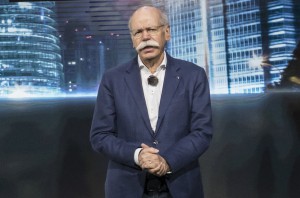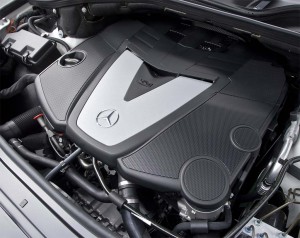
Daimler's Dieter Zetsche said that the company's ambitious EV plans don't mean it's abandoning diesels.
Even as it moves to add electric vehicles to broad portfolio cars and trucks, diesel engines will continue to play an important role meeting the needs of customers, Daimler executives told shareholders during the company’s annual shareholders meeting in Berlin.
Dieter Zetsche, the outgoing chief executive officer, said the changes to product lines of both Mercedes-Benz Cars and Daimler Trucks will underscore the shift toward electrification. “We mean business when talk about electrification,” Zetsche said.
“For example, our passenger car portfolio now includes more than 40 attractive models. This year alone will more than a dozen new ones. Our position has never before been as broad or as strong at vans, trucks and buses as well – in all regions of the world.
“When it comes to drive systems, our strategic focus is the electrification of our products. For our cars alone, we are putting 10 billion euros into the expansion of our electric fleet.
(Daimler AG ushers in new era with massive reorganization. Click Here for the story.)
Next month, Mercedes will have customers in the automaker’s first (all-electric) EQCs. It is the first Mercedes model from our EQ electric brand. It is spearheading a new electric era at Mercedes. By 2022, the entire Mercedes portfolio will feature more than 130 electrified variants.
Increasing the number of electric vehicles in our unit sales, Daimler must inspire more customers with those vehicles and “I am convinced that we will set new standards with our electric cars,” Zetsche said.
“They will offer our customers all of the things they love about Mercedes – along with a unique design, even more driving enjoyment and even more emotion,” he added.
“We are electrifying all commercial model series of our vans. With the Fuso eCanter, Daimler Trucks was the first manufacturer to bring a fully electric truck into series production. As global market leader, we also want to be at the top with our electric trucks,” Zetsche noted.
Zetsche, however, added that the transformation to the sustainable mobility of the future can only be successful if industry and government work hand-in-hand. “On the way there we should make use of all available means the rapid reduction of carbon dioxide emissions — including highly efficient combustion engines and, in particular, diesel,” said.
(Click Here for more about Mercedes taking orders for the new EQC battery-electric vehicle.)
The modern diesel engine hasn’t been a significant source of particulate matter for years. Today the NOX challenge is technically resolved. At the same time, diesel vehicles still have a clear carbon dioxide advantage over comparable gasoline-driven vehicles.
“The diesel engine is part of the solution,” he said. “That is why we assume it will continue to play an important role in Europe for at least another decade — maybe even longer in the commercial vehicles area.
The mobility of the future is not a monoculture. This is also because the technological transformation in our industry goes way beyond new drive systems, Zetsche said. Autonomous driving will change our mobility even more powerfully than connectivity, said Zetsche, adding that Mercedes-Benz will begin experimenting with AVs in California later this year.
During the annual shareholders meeting, shareholders noted that the diesel scandal, which has engulfed the German auto industry continues to threaten Daimler AG, which is enmeshed in litigation with the German government over the use of so-called “defeat” devices that circumvent existing emission regulations.
The German government also has ordered Daimler to recall more than 700,000 cars and trucks.
(Daimler prepares cost-cutting plans for new chief Kallenius. Click Here for the story.)
Daimler has put its diesel related financial obligations at more than 300 million euros. The critical shareholders, however, said the estimate was way too low given the potential scope of the fines and other expenses facing the company.

